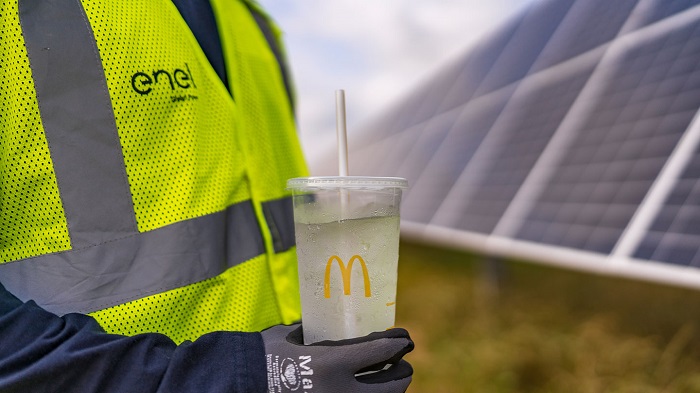McDonald’s & U.S. Logistics Partners Tackle Supply Chain Emissions in New Enel Solar Energy Deal
McDonald’s Corporation and all five members of the restaurant chain’s North American Logistics Council (NALC) – Armada, Earp Distribution, Martin Brower, Mile Hi Foods and The Anderson-DuBose Company – have signed agreements with Enel North America to purchase renewable energy and the associated renewable energy certificates (RECs) from Enel Green Power’s Blue Jay solar project in Grimes County, Texas. This innovative aggregation of a major company purchasing power jointly with its logistics partners means the electricity load of McDonald’s USA’s entire logistics supply chain for all its U.S. restaurants is expected to be 100% supported by renewable energy.
The Blue Jay solar project is expected to be fully operational in 2023. Once complete, McDonald’s and its suppliers’ combined electricity purchase is expected to amount to an estimated average of over 470,000 megawatt hours (MWh) of renewable energy annually. This is equivalent to avoiding over 170,000 metric tons of carbon emissions annually or the greenhouse gas (GHG) emissions from over 80 million trucking miles driven each year2.
“Adding Blue Jay solar to our U.S. renewable energy portfolio is one of the many important steps in our journey to achieving our net zero aspirations,” said Bob Stewart, SVP and Chief Supply Chain Officer, North America, at McDonald’s. “This deal is a unique example of how McDonald’s and its logistics partners are combining efforts to leverage their reach and scale to tackle supply chain emissions together. We are excited about our collective potential to help address climate change and drive continuous improvement.”
Supply chain emissions, which are categorized as Scope 3 emissions by GHG Protocol, are challenging to address and measure because they’re driven by activities that are beyond the direct control of the organization, such as the transportation and distribution of products. Scope 3 emissions account for 75% of companies’ GHG emissions on average, according to 2022 report released by CDP.
“While major corporations are increasingly encouraging and advising their partners on how to reduce their carbon emissions, McDonald’s took it one step further by becoming the anchor buyer alongside its suppliers. McDonald’s and the NALC recognized early on that collaboration across the supply chain is the only way to effectively address electricity emissions for all logistics suppliers,” said Danny Fahey, NALC Sustainability Lead and Vice President of U.S. Strategy at Martin Brower. “This aggregation represents how a joint effort will be essential to making continued progress towards climate goals.”
The combined purchase of 189 megawatts (MW) of renewable power, equivalent to more than 900 U.S. McDonald’s restaurants-worth of renewable energy annually, is intended to help McDonald’s and the NALC members meet their ambitious climate commitments.
“This innovative deal demonstrates how Enel is helping major companies take a hands-on approach in helping their partners decarbonize their operations,” said Paolo Romanacci, head of Enel North America’s renewable energy business, Enel Green Power. “We’re honored to be part of such a monumental deal and look forward to helping McDonald’s and its suppliers achieve their supply chain emission reduction goals through this tailored solution.”
Enel, McDonald’s and its suppliers are committed to creating long-term value in the local communities surrounding the Blue Jay solar project. The companies signed a mutual letter of intent to participate in Enel’s Premium Offer program and co-develop community investment projects that align with the core values of each company.
Approximately 275 jobs have been created during the construction phase and the project is expected to generate more than $41 million in new tax revenue over its operating life for state taxing entities. Furthermore, Enel has committed over $216,500 to fund STEM and upskilling programs for local schools and colleges since the start of the project’s construction in May 2021. The Blue Jay project also includes an 88.2 MWh battery energy storage system, which will help support the reliability of the local energy grid.
The buyer aggregation was facilitated by Coho Climate Advisors.
“Close collaboration amongst all parties during a challenging time in the renewable energy industry proved crucial to create this impressive agreement,” said Gavin Ahern, Director of Client Service for Coho Climate Advisors.
Source: McDonald’s


